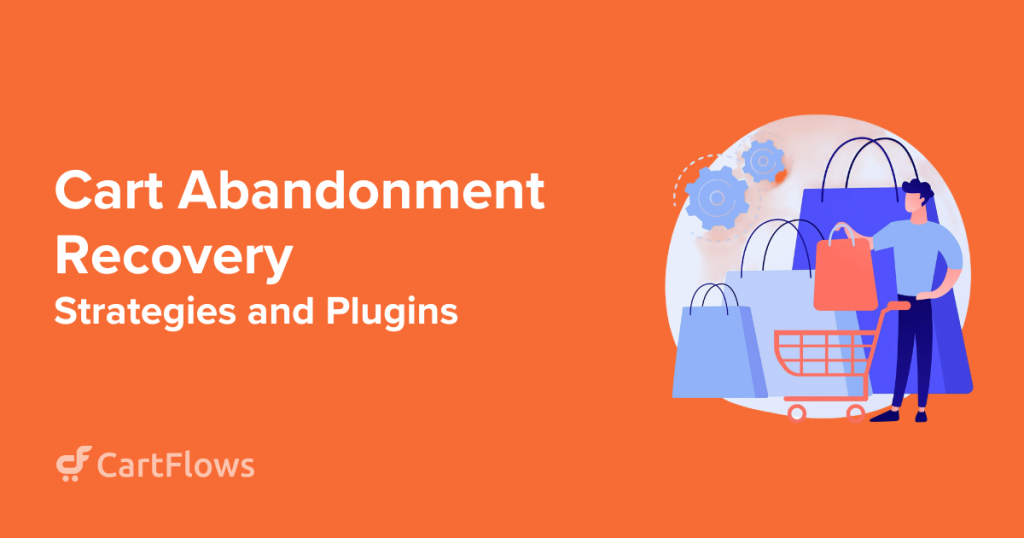Shopping carts get abandoned. A lot. Nearly 70% of WooCommerce customers add products to their cart and leave without buying.
That’s approximately $260 billion annually lost to cart abandonment, representing one of the largest untapped revenue opportunities in eCommerce.
If you’d rather capture this untapped revenue than watch it drain, you’re in the right place.
We’ll show you some WooCommerce cart abandonment recovery strategies and systems that automatically recover these lost sales.
- What Is Cart Abandonment?
- What is Cart Abandonment Recovery?
- Abandoned Cart Recovery Strategies That Really Work
- WooCommerce Abandoned Cart Email Recovery
- Top WooCommerce Cart Abandonment Recovery Plugins
- Avoid These Common Cart Recovery Mistakes
- Cart Abandonment Recovery FAQs
- Start Recovering Abandoned Carts Today!
What Is Cart Abandonment?
Shopping cart abandonment is what happens when visitors add products to their shopping cart but leave before completing the purchase.
WooCommerce captures some data about these partially completed transactions, creating opportunities to re-engage prospects who’ve already shown purchase intent.
The numbers behind shopping cart abandonment reveal both the challenge and the opportunity here:
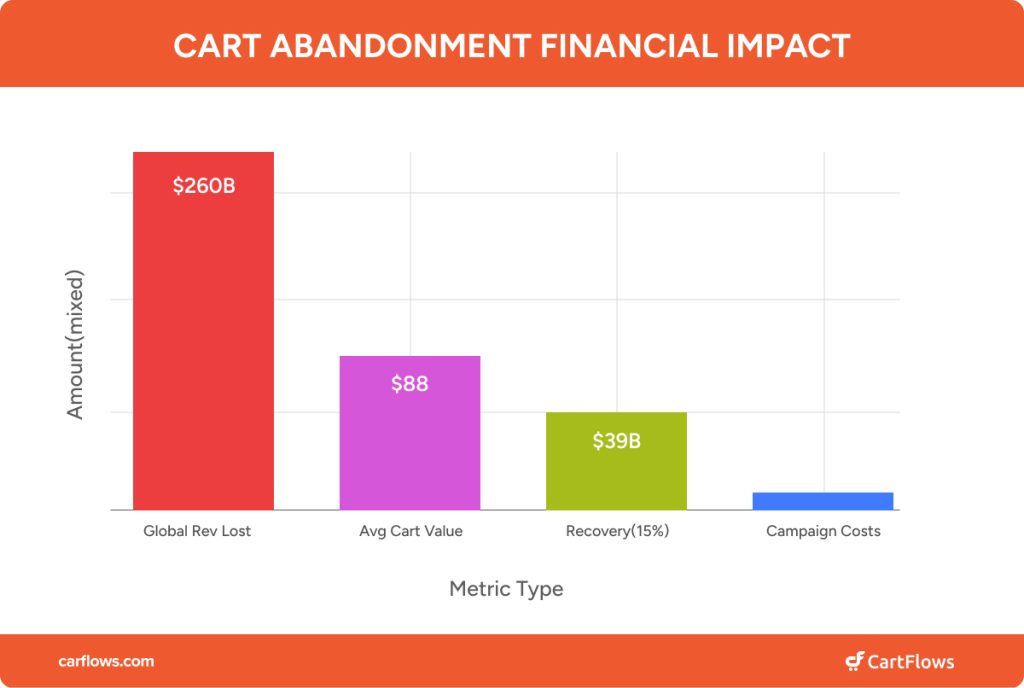
- Average abandonment rate sits at 70.19% across all industries, meaning most visitors leave without buying.
- Luxury goods see abandonment rates of 81.68%, the highest among all retail categories.
- Home and furniture stores experience 78.65% abandonment, likely due to them being high-consideration purchases.
- Global lost revenue reaches $260 billion annually, representing massive untapped potential.
- Average abandoned cart value equals $88, showing substantial per-customer opportunity.
- Recovery rates of 10-30% are achievable with proper email sequences and follow-up strategies.
We’ve sourced the above stats from the Baymard Institute.
These numbers demonstrate both the magnitude of the problem and the enormous potential for revenue recovery.
What is Cart Abandonment Recovery?
Cart abandonment recovery includes the strategies, tools, and tactics you use to re-engage customers who didn’t complete their purchase.
Instead of writing them off as lost sales, recovery systems let you reconnect with interested buyers through targeted emails, personalized offers and strategic timing.
Why Customers Abandon Their Cart
Here are the top 6 reasons why customers abandon carts at checkout according to that same Baymard Institute study.
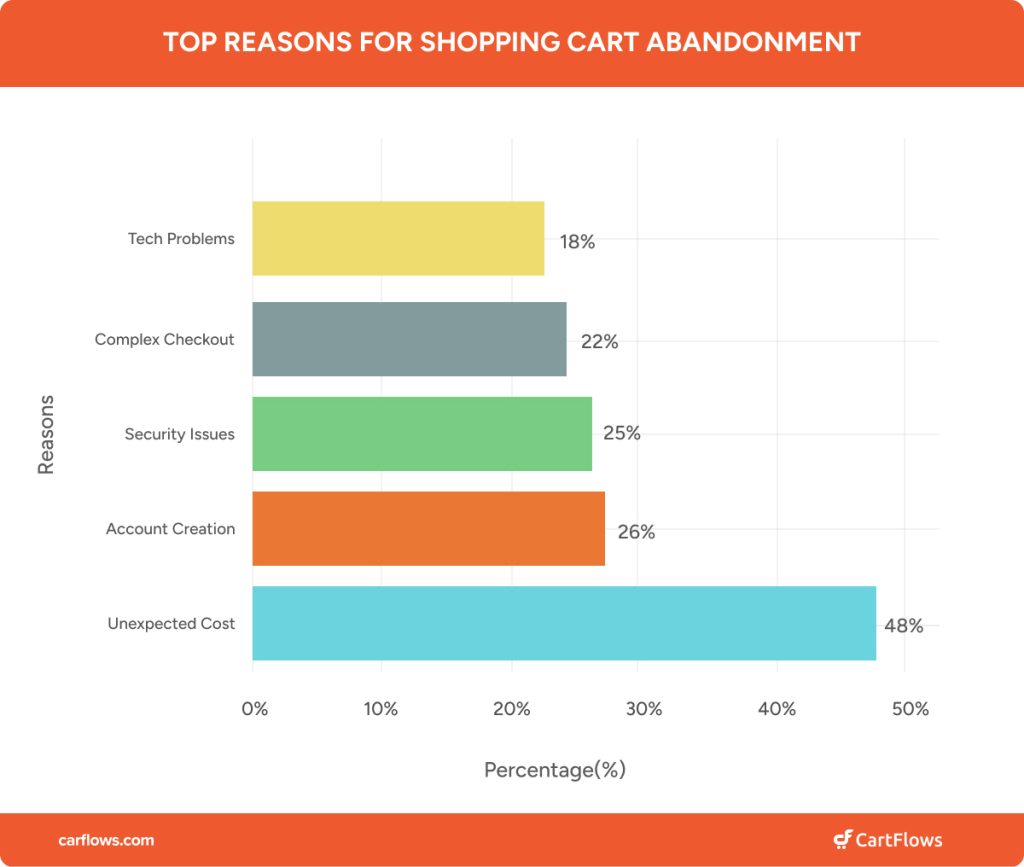
1. Unexpected Costs at Checkout – 48%
Nearly half of all those who abandon carts cite unexpected costs as their primary reason for leaving. Shipping fees, taxes, handling charges, and additional fees that appear during checkout create sticker shock that drives away even committed buyers.
Customers expect transparency throughout their shopping journey, and surprise costs at the final step violate that trust.
Quick fix: Display shipping costs early on, offer free shipping thresholds, or build delivery costs into product pricing to avoid surprises.
2. Mandatory Account Creation – 26%
26% of shoppers abandon carts when forced to create accounts. Account creation adds friction to the buying process, especially for first-time customers who want to test your products and service quality before committing to ongoing relationships.
Quick fix: Add guest checkout to remove the account creation barrier while still capturing customer information for future marketing efforts.
You can encourage account creation with a checkbox so customers can choose to create the account or not as they prefer.
3. Slow Delivery – 21%
Amazon has raised customer expectations with their one day delivery. So when a customer visits your store and sees 5-day delivery, they may go elsewhere because they think that’s too long.
Quick fix: Add free or paid express shipping. Depending on your margins, you could absorb the express shipping charges at least within certain regions, or ask customers to pay an additional fee.
4. Security and Trust Concerns – 25%
Security worries affect 25% of potential customers, particularly those shopping with unfamiliar brands or websites that lack trust signals.
Customers need confidence that their payment information, personal data and purchase details remain secure throughout the transaction.
Quick fix: Building trust requires displaying security badges, SSL certificates, customer reviews, money-back guarantees and clear privacy policies.
Professional website design, error-free checkout processes, and recognizable payment methods also contribute to customer confidence.
5. Complicated Checkout Process – 22%
Complex checkout flows frustrate 22% of customers who expect streamlined, intuitive purchasing experiences.
Multi-page checkouts, confusing navigation, required fields that seem unnecessary, and unclear progress indicators create friction that drives away potential buyers.
Quick fix: Successful stores optimize their checkout processes by reducing form fields, implementing single-page checkouts, providing clear progress indicators and eliminating unnecessary steps that don’t directly contribute to a purchase.
6. Technical Issues and Performance Problems – 18%
Website performance problems, payment processing errors, mobile compatibility issues, and system crashes cause approximately 18% of cart abandonments.
Customers have little patience for technical difficulties, especially when they’re ready to complete purchases and move on with their day.
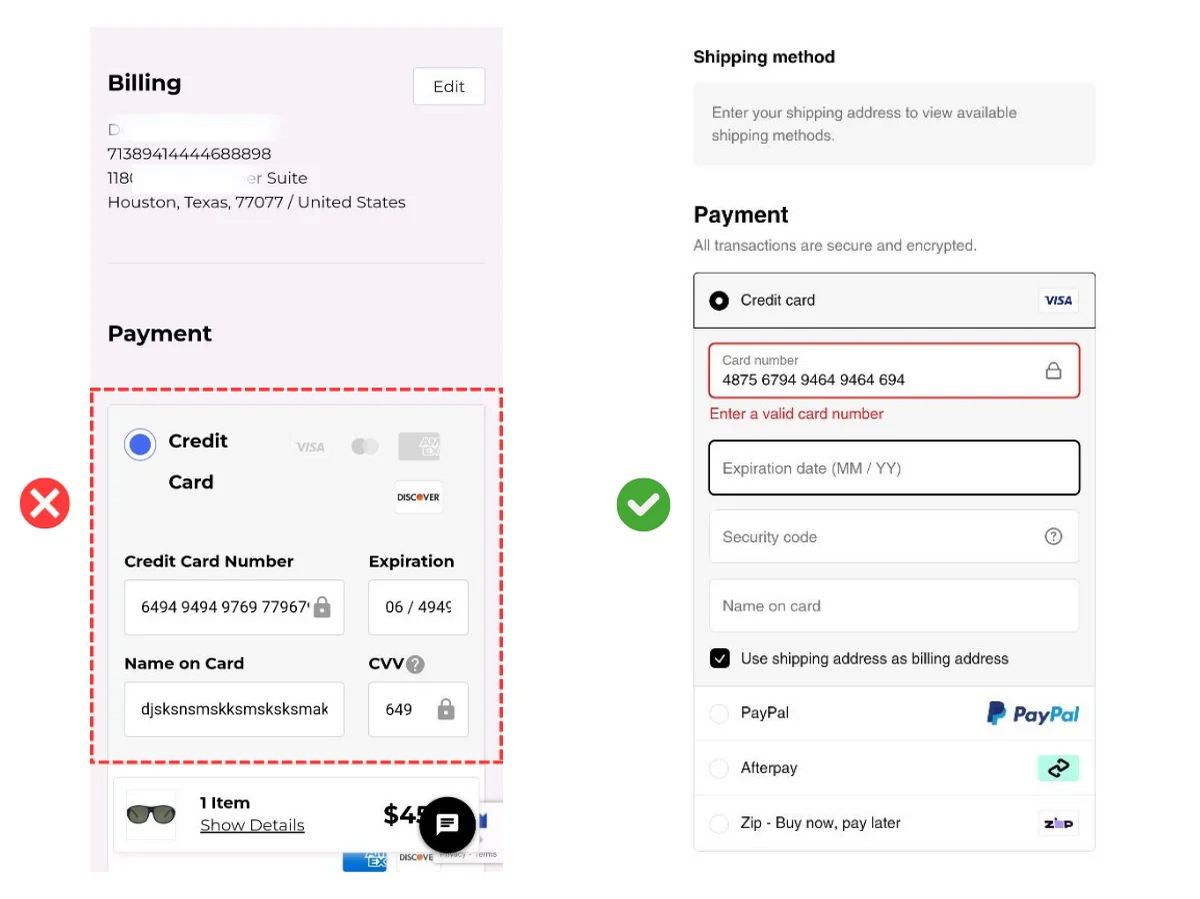
Quick fix: Regular website maintenance, mobile optimization, payment gateway testing, and performance monitoring help prevent technical barriers that interfere with successful transactions.
Abandoned Cart Recovery Strategies That Really Work
The most successful abandoned cart recovery strategies combine immediate fixes with long-term improvements that reduce abandonment rates over time.
1. Optimize the Checkout Experience
An optimized checkout process reduces initial abandonment while making recovery emails more effective when customers return to complete their purchases.
There are multiple ways to optimize your checkout experience:
- Creating single-page checkouts to eliminate navigation confusion and reduce the steps between cart and completion.
- Enabling guest checkout options to remove barriers. Multiple payment methods accommodate different customer preferences.
- Building mobile-responsive designs that ensure smooth experiences across all devices.
- Auto-filled shipping and billing information to speed up repeat purchases.
You can also display progress completion bars and clear error messages so users are not left confused when they are absolutely ready to make the purchase.
2. Implement Exit-Intent Popups
Sometimes a user needs a little push like a discount or free shipping to make the purchase. But capturing the user at the right time is what matters the most.
Exit-intent technology detects when visitors move their cursors toward the browser’s close button or back arrow, triggering last-chance offers before they leave your site.
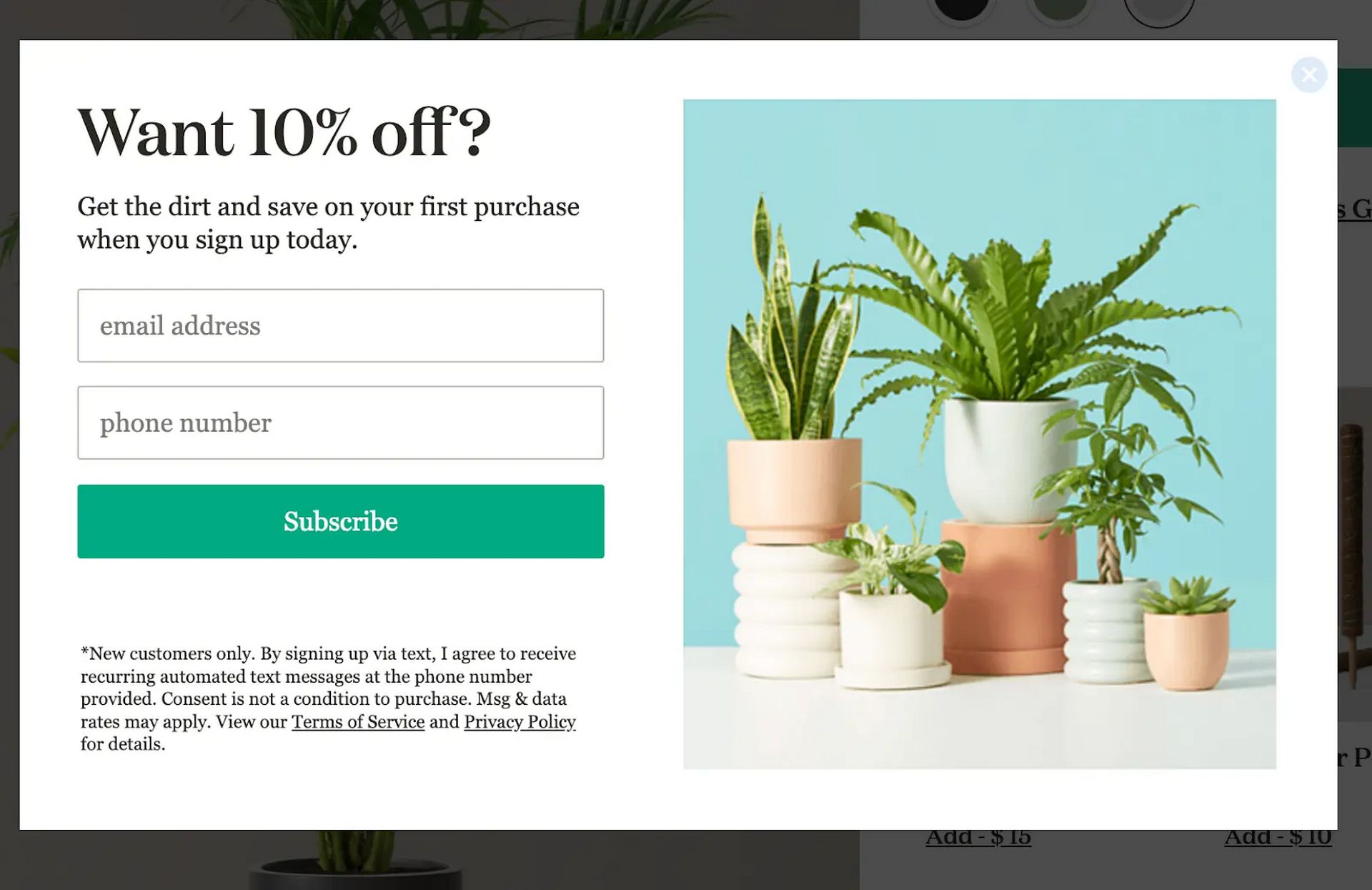
Effective exit-intent campaigns offer:
- Modest discounts
- Free shipping
- Limited-time bonuses
These offers provide just enough incentive to complete the purchase immediately. Make sure not to show the popup to the same customer too many times as that just trains them to expect the exit intent discount!
3. Build Trust and Remove Friction
People need to trust your store to make the purchase. And if you don’t have a well known brand, building trust can be difficult.
So, what you need to do is start by adding trust elements across your store and product pages.
That could be by showing customer testimonials, money back guarantees, security badges, displaying your return policies clearly.
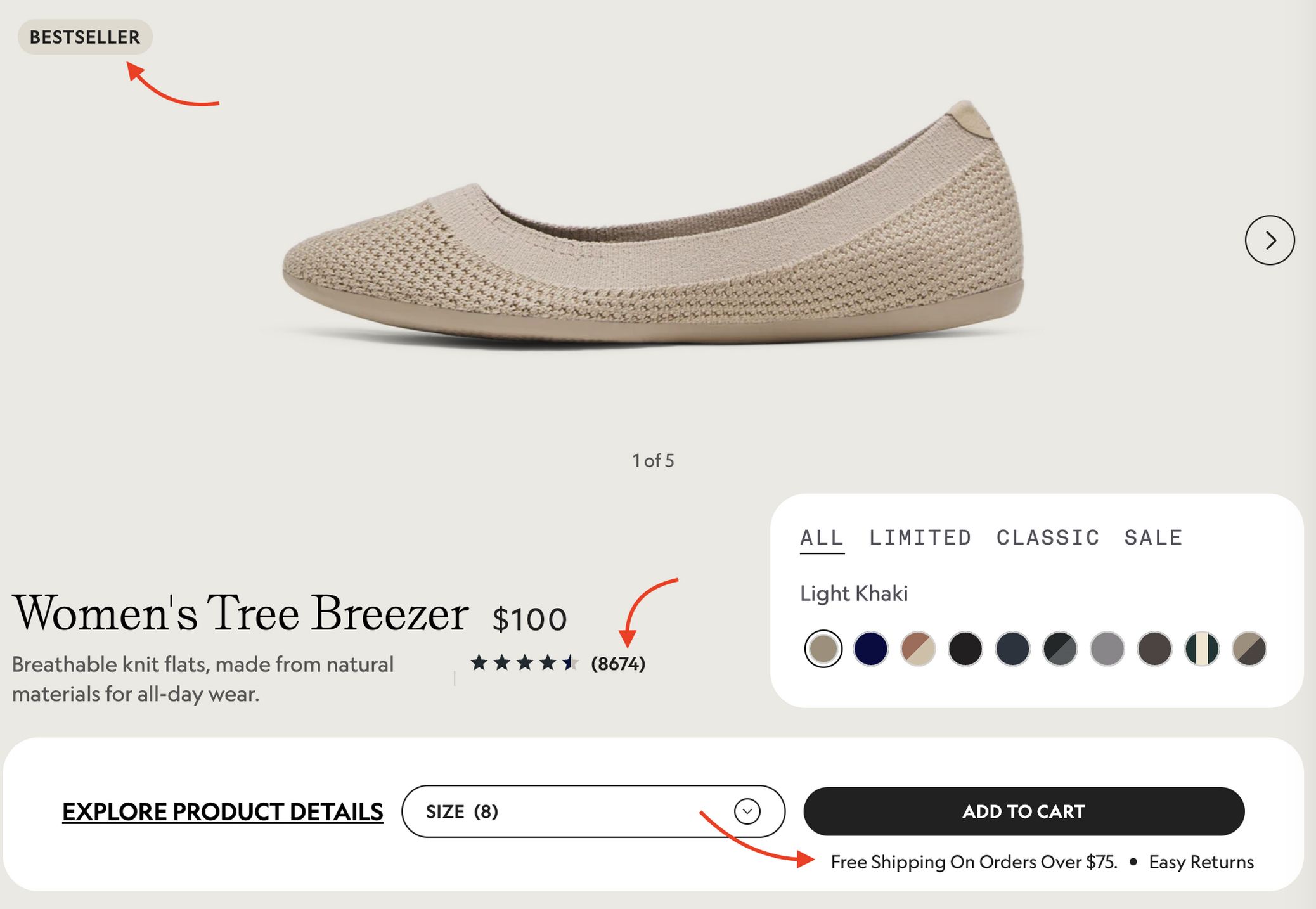
All of these combined help contribute to the customer’s confidence.
You may also want to display additional costs and taxes upfront if possible. Include everything inside the pricing so that there are no surprise additions at checkout.
Also add relevant testimonials to the product pages if possible to build customer confidence.
WooCommerce Abandoned Cart Email Recovery
Email campaigns work because they reach customers in familiar environments where they regularly check messages and make decisions.
1. Email Cart Recovery Sequence
The most successful cart recovery campaigns are persistent, but not annoying.
You want to give customers a reason to come back and complete the checkout. Similar to the exit intent popup, people generally just need a nudge in the form of a free product or discount.
Here’s an example of a cart recovery email campaign from Rudy’s that we found interesting.
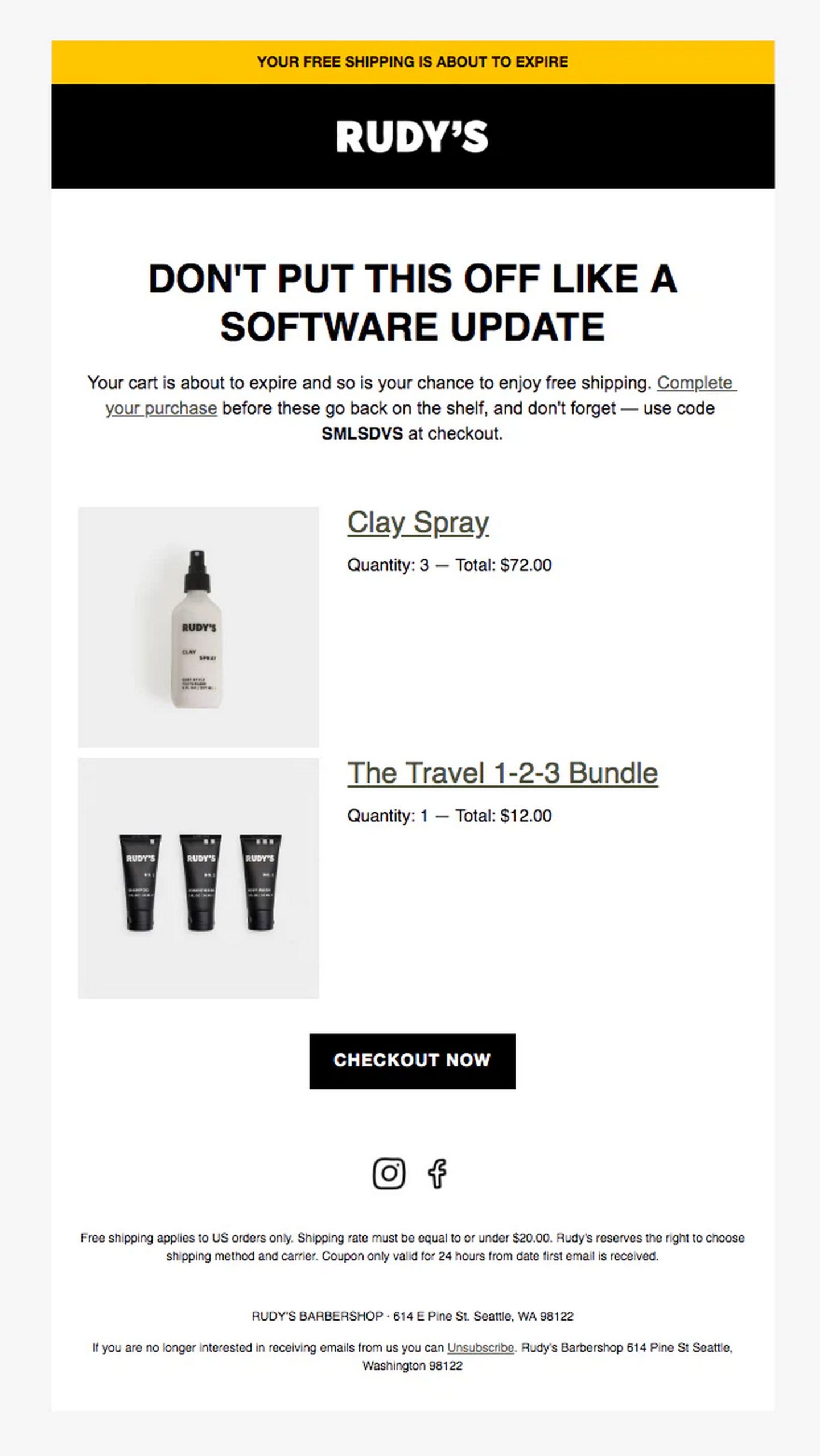
There are a couple reasons why we think this works well.
First off, it’s personalized. The email lists the exact items from the cart and gives a link to directly check out.
Second, there’s a coupon code that offers free shipping. And the final touch is the mention that the “Free shipping is about to expire” right at the top of the email.
Rudy’s sends these emails twice, which is just enough time to try and win the customer back while also not annoying them to the point of unsubscribing.
If you don’t want to pay for a cart recovery plugin, pair a free abandoned cart recovery tool like CartFlows or Ottokit, a no-code automation platform.
CartFlows already has email follow ups. Ottokit lets you build more advanced automations like sending a short sequence of emails after a successful recovery recommending relevant products.
Top WooCommerce Cart Abandonment Recovery Plugins
Choosing the right abandoned cart recovery plugin depends on store size, budget, technical requirements and desired automation level.
Free Plugin Options
CartFlows Abandoned Cart Recovery: CartFlows provides abandoned cart recovery as part of their broader checkout optimization suite.
The plugin tracks cart abandonment, sends automated email sequences and provides recovery analytics within your WooCommerce dashboard.
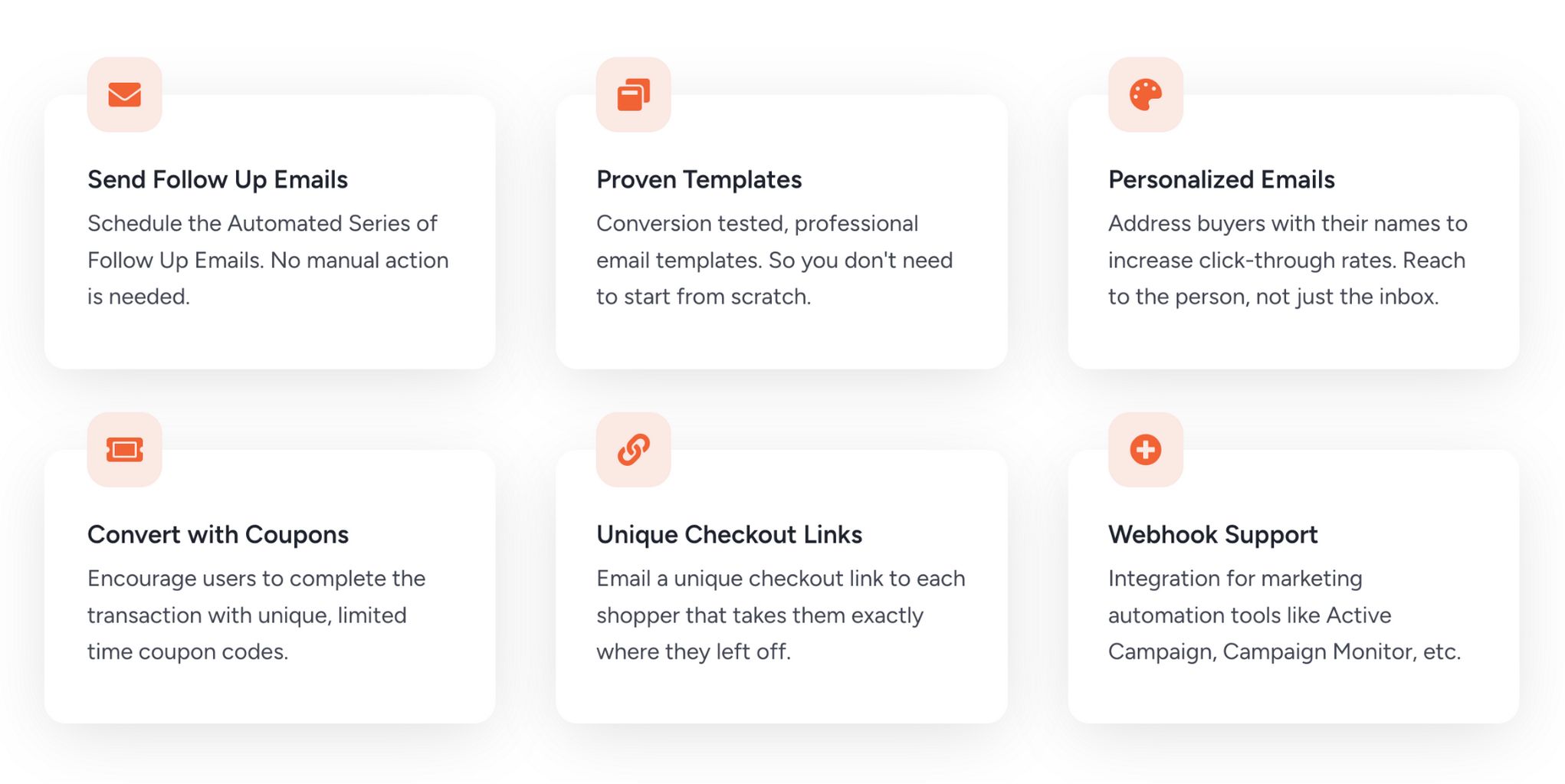
The free version includes personalized email templates, customizable timing settings, and simple reporting features.
Setup requires minimal technical knowledge, making it accessible for small store owners who want to test cart recovery without upfront investment.
Abandoned Cart Lite for WooCommerce: Abandoned Cart Lite offers essential recovery features including automated email sequences, customizable templates, and basic reporting capabilities.

The plugin captures guest user data through email collection popups and tracks registered user behavior automatically.
The plugin includes unsubscribe management and GDPR compliance features that protect customer privacy while enabling recovery campaigns.
Premium Solutions
Omnisend Omnisend combines email marketing with cart recovery automation, offering multi-channel campaigns that include email, SMS, and push notifications.
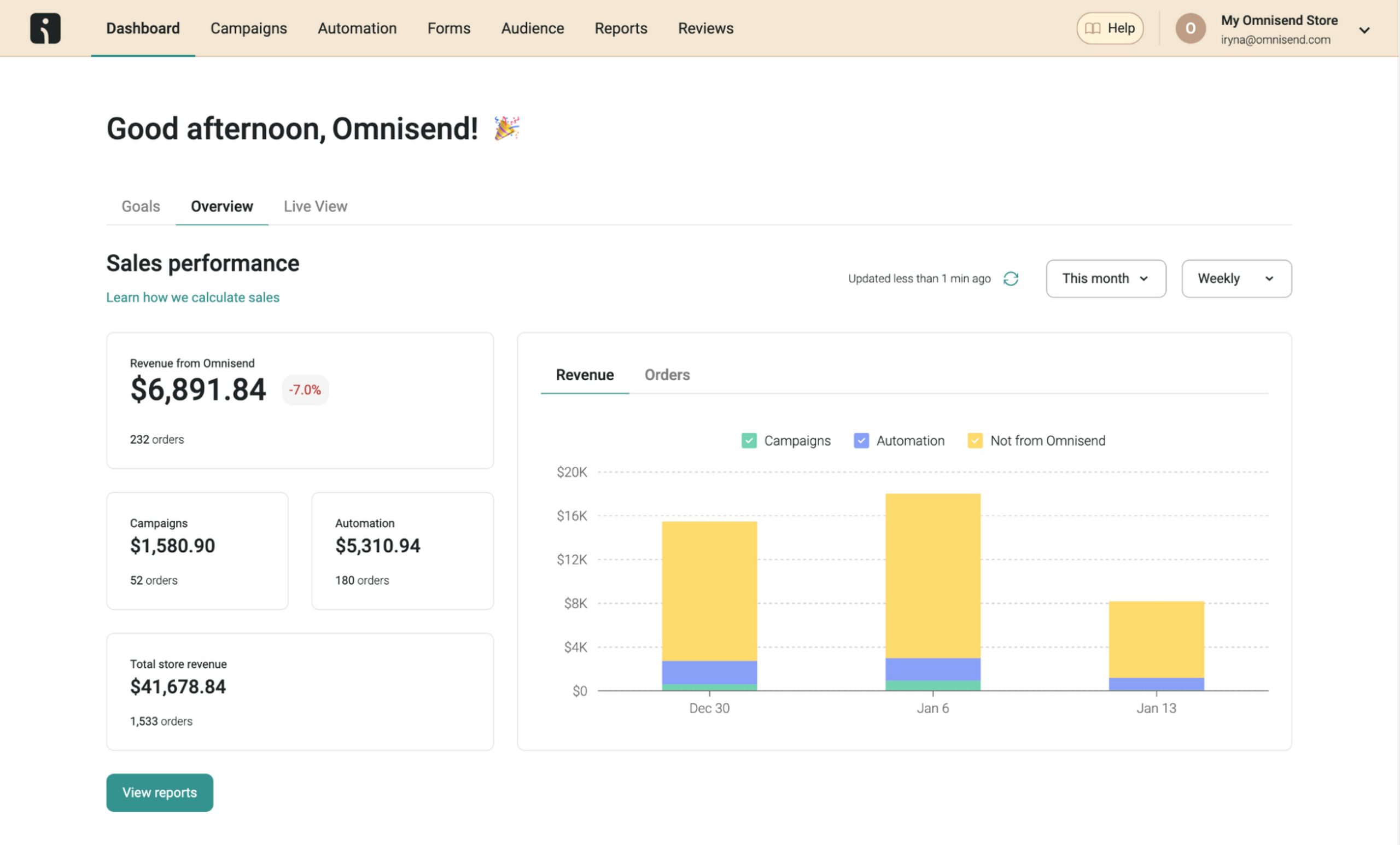
The platform provides advanced segmentation, behavioral triggers, and comprehensive analytics that track revenue attribution across all touchpoints.
Pricing starts free for up to 250 contacts, then scales to $41.30 monthly for advanced features.
The platform integrates with major WooCommerce extensions and provides pre-built automation workflows that activate immediately after installation.
YITH WooCommerce Recover Abandoned Cart YITH provides comprehensive recovery tools including exit-intent popups, email automation, and advanced scheduling options.
The plugin offers extensive customization capabilities and integrates with other YITH extensions for complete store management.
Annual pricing starts at $89.99 with lifetime updates and support. YITH includes features like A/B testing, advanced reporting, and multi-language support for international stores.
Markopolo AI – Markopolo is a revenue orchestration platform with AI-powered cart recovery features for e-commerce platforms including WooCommerce. It tracks real-time user behavior and executes hyper-personalized, multichannel outreach with AI agents at scale.
When a shopper abandons their cart, Markopolo understands why they left and determines whether they are more likely to respond to a follow-up via email, SMS, WhatsApp, or a phone call.
Pricing starts at $49.99 per month, with custom plans also available.
Avoid These Common Cart Recovery Mistakes
If you don’t set them up carefully, cart recovery campaigns can do more harm than good, pushing customers away instead of bringing them back.
Bad Timing
Sending recovery emails too quickly makes you appear pushy and desperate. Waiting too long allows customer interest to fade completely.
You need to work to find the balance that works for your audience through systematic testing.
Going Overboard With Follow Ups
Bombarding customers with daily recovery emails creates annoyance that leads to unsubscribes and negative brand associations.
Respect customer preferences and provide easy opt-out mechanisms for recovery campaigns specifically. Three emails over 3-5 days works well for most stores. More emails rarely improve results.
Generic Content
Generic, one-size-fits-all recovery emails ignore customer preferences and behavior patterns.
Personalization and segmentation require more effort but deliver significantly better results than mass messaging.
Use customer names, reference products in their cart and tailor offers based on purchase history.
Technical Failures
Broken links, mobile formatting problems, and email delivery issues can all get in the way of successful recovery campaigns.
Regular testing and monitoring ensure your technical infrastructure supports your marketing goals.
Most customers check emails on phones, so make sure templates display correctly on all devices and buttons are large enough for touchscreens.
Cart Abandonment Recovery FAQs
What is WooCommerce cart abandonment recovery?
WooCommerce cart abandonment recovery refers to strategies and tools that automatically re-engage customers who added products to their cart but left without completing the purchase. Typical channels include email campaigns and targeted offers.
How long should I wait before sending recovery emails?
We recommend sending your first recovery email around 1-4 hours after cart abandonment while your brand remains fresh in the customer’s memory. Follow with additional emails at 24-hour and 72-hour intervals for optimal results.
What’s the ideal number of cart recovery emails to send?
We find 2-3 emails per abandoned cart works best. The first email should be a gentle reminder, the second can include incentives, and the third should create urgency without being pushy.
What’s the best timing for the first recovery email?
Send the first recovery email within 1-4 hours after cart abandonment. This timing captures customers while your products remain top-of-mind without appearing overly aggressive.
Do discount codes always improve recovery rates?
Discount codes can improve recovery rates but may train customers to abandon carts expecting offers. Use discounts strategically in second or third emails rather than initial reminders.
What’s the average revenue lift stores see after implementing cart recovery?
Most stores can see 10-15% revenue increases from cart recovery campaigns, with some experiencing up to 30% improvements as per CartFlows’ data. Much depends on the previous abandonment rate and campaign effectiveness of course.
Can I recover guest checkout abandoners?
Yes, but you need to capture email addresses before checkout completion through popup forms or email collection. Many plugins offer guest email capture specifically for recovery purposes.
Can I automate abandoned cart recovery without coding?
Yes, most WooCommerce cart recovery plugins provide point-and-click setup with pre-built email templates and automation workflows that require no coding knowledge.
Are abandoned cart recovery plugins GDPR-compliant?
Reputable plugins include GDPR compliance features like consent management and data deletion capabilities. Always verify compliance features before implementing any email collection or automation system.
Start Recovering Abandoned Carts Today!
Cart abandonment is the biggest challenge and the largest opportunity for WooCommerce store owners today. But to make use of this opportunity, you need to get started.
Pick a cart recovery plugin, set up the basics, and test it out for a few days. If you have steady sales, a cart recovery plugin would show you an almost immediate positive impact on your revenue.
If this sounds like something you want to try, give CartFlows a shot. It’s free and has all the features you’d need to get started with recovering your carts.
Get started with CartFlows Abandoned Cart Recovery today and see how you can reduce abandons with almost no effort!
